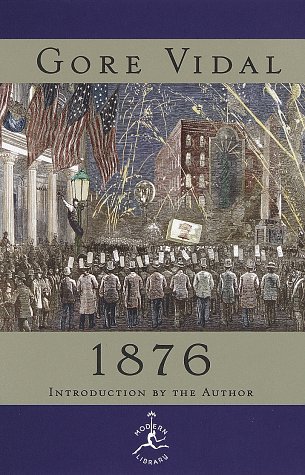

 |

|

The average rating for 1876 based on 2 reviews is 3.5 stars.
Review # 1 was written on 2009-07-05 00:00:00 Francis Ellis Francis EllisI'm going through my Gore Vidal collection and am re-reading (and in some cases for the first time reading) the Narratives of Empire collection. I love 1876. Every damn page of it. This is the way America was/is not as the gullible unhistoric American public perceives it. I'm a trained historian, and GV is so correct in his portrayals of so-called icons. 1876 is not only a narrative of post-war Washington/New York high and political society, but a comedy of manners. The hand of Henry Adams isn't far from sight--and in some cases is--as with Baron Jacobi. (And the "large party" at which Charlie Schuyler and The Princess of d'Agrigente are introduced to the Grants is reminicent of Mrs. Lee's introduction to "the president" in Democracy." One again GV sends me to the 'net to check out players I'd not thought of much lately (I actually do think about these people!) Blaine, Tilden, Julia Dent Grant, William Cullen Bryant, Madame Restell. Now I want to find a good bio of General Grant and James A Garfield (I believe a new bio is out on him). When I was a kid I used to eat at his former home in Hiram, Ohio, Bonnie Castle Inn. Now, the big questions is Emma. 1876 is a very timely book, only 136 yeas later, the boodle and stakes is bigger.RIP America. |
Review # 2 was written on 2017-02-22 00:00:00 Andy Griggs Andy GriggsOne of Gore Vidal's weakest novels, 1876 examines America's Gilded Age with an excess of archness and a dearth of wit. An antiquated Charlie Schuyler, the narrator-hero of Burr, returns with his daughter on a tour of America during its centennial celebration, becoming disgusted and fascinated by postbellum America's inequalities and the open corruption of Ulysses Grant's Administration. Throughout, Vidal succumbs to his worst instincts as a writer: nearly two-thirds of the text consists of Schuyler indulging in an endless whirl of dinners, parties, backroom deals and snarky chats about the American Character. There's plenty of high-table mirth and cynical aperçus ("Think always of the future, and how much worse it is bound to be!") but little true analysis of the era; Vidal has nothing to say about Reconstruction, westward expansion (save some fleeting references to Custer), the era's capital-labor disputes or, indeed, anything but the self-absorption of the rich. It doesn't help that Schuyler is not only insufferable (like many Vidal heroes, he wears his vices as a badge of pride against the stuffed-shirted hypocrisy of the respectable classes) but so peripherally involved in events that he can't provide any insights, only scorn for what he sees (and those who think America can, or should be better than this). The narrative's densely peopled with historical and literary figures (Grant, Samuel Tilden, Mark Twain, etc.), all of whom remain strictly at the levels of cameo or caricature. The narrative finally jolts to life in the final 80 pages or so, as the disputed Hayes-Tilden presidential election threatens to spark a second civil war. Too bad Vidal's done so little prepare us for it; after an endless whirl of backbiting gossip, greedy tycoons and crooked politicos, even the electoral powder keg proves a damp squib. Historically, how could it not? But surely it's Vidal's job, as novelist, to invest events with some life, drama or illumination; instead, he produces a self-indulgent bore with little to say. |
CAN'T FIND WHAT YOU'RE LOOKING FOR? CLICK HERE!!!